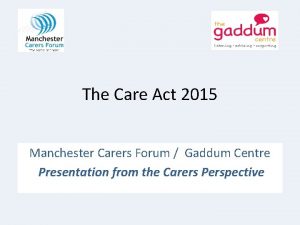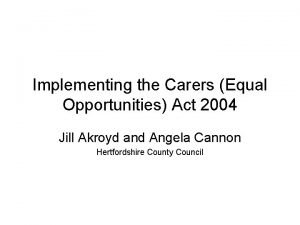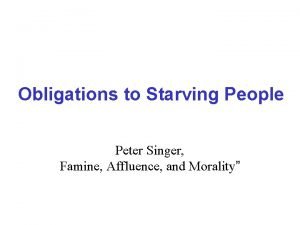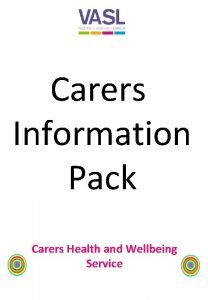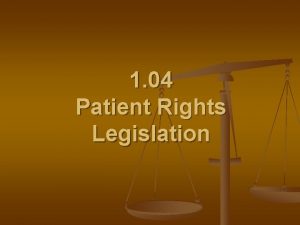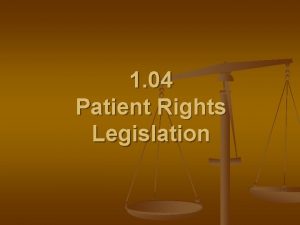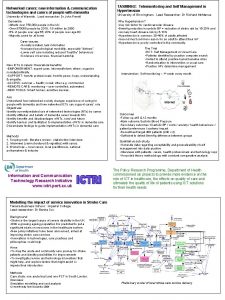MENTAL HEALTH LEGISLATION CARERS RIGHTS Mental Health Legislation














- Slides: 14

MENTAL HEALTH LEGISLATION & CARERS RIGHTS Mental Health Legislation Department

Mental Health Act 1983 (Amended 2007) “Everyone including carers and families needs to know about the Code and all communication channels – from bottom to top and vice versa including sideways – should remain open for the benefit of all” Expert Reference Group carer

Empowerment and involvement of patients and carers, and dignity and respect are principles underpinning the Mental Health Act.

MHA Code of Practice Guiding Principles • Least restrictive option and maximising independence • Empowerment and involvement • Respect and dignity • Purpose and effectiveness • Efficiency and equity

Unless there are good reasons to the contrary, patients should be encouraged to agree to their carers being involved in decisions under the MHA and to them being kept informed If patients lack capacity to consent to this, it may be appropriate to involve and inform carers if it is in the patient’s interests

In order to ensure that carers can, where appropriate, participate fully in decision making, it is important that they have access to: • practical and emotional help and support to assist them in participating • timely access to comprehensive, up to date and accurate information, and • have a right to be given a copy of the patient’s care plan if (a) the patient consents, or (b) issues of duty of care or risk override patient objections

If carers request that the information they provide is kept confidential, this should be respected and recorded in the patient’s notes. A carer should be asked to consent to such information being disclosed. Where a carer refuses to consent, professionals should discuss with the carer the benefits of sharing information in terms of patient care and how their concerns could be addressed.

• The right to require an assessment to be made • The right to apply for compulsory admission • The right to information and consultation before the patient is admitted to hospital • The right to information and consultation after the patient is admitted to hospital • The right to review of the patient’s detention

• The right to discharge the patient • The right to instruct an independent mental health advocate to visit the patient • The right to be told when the patient is about to be discharged • The right to delegate the role of nearest relative

Can help or advise on best ways of communicating with a patient. Carers’ centres can advise carers on their rights and answer general questions on MHA, Code of Practice, procedures and other issues. Using carers as intermediaries or interpreters is not good practice and should only exceptionally be used – including when the patient is a child or young person. Interpreters (professional and non-professional) must respect the confidentiality of any personal information they learn about through their involvement

Carers and advocates should be involved, where the patient wishes or if the patient lacks capacity to understand, in reaching decisions which affect the patient’s care and treatment under the Mental Health Act. A patient and persons supporting them (family, carer etc), especially a patient lacking capacity, must be supported to make a complaint if they think the safeguards of the Mental Health Act are not being appropriately applied or they have concerns about the care and treatment being provided.

Mental Capacity Act 2005 • right to be consulted by professionals in assessing someone’s capacity, (though occasionally this will be impossible, such as in an emergency) • right to be involved in determining what is in the best interests of the person being cared for, if that person lacks the mental capacity to make a decision • right to be named as attorney in person’s Lasting Power of Attorney

• right to be immune from prosecution following the results of a decision made on behalf of an individual, if carer has a reasonable belief that the person lacks capacity and that the action they are taking is in that person’s best interests • right (as a third party) to apply for an independent assessment of whether someone has justly been deprived of their liberty from the Court of Protection

Advance Statements/Advance Decisions Can my family/carer overturn an Advance Decision? No – this is a statement of the person’s wishes or in the case of an Advance Decision it is their refusal of a treatment and cannot be overturned by anyone unless: • They have a signed LPA to appoint a health and welfare attorney after the Advance Decision and given authority to the attorney to accept or refuse treatment to which the Advance Decision relates • Revoke the Advance Decision at a time when the person has mental capacity • The Advance Decision was made when the person did not have capacity • Undue influence was used by others to make the Advance Decision
 Carers allowance and universal credit
Carers allowance and universal credit Nebuliser training
Nebuliser training York carers centre
York carers centre Barnet carers
Barnet carers Manchester carers forum
Manchester carers forum Equal opportunities act 2004
Equal opportunities act 2004 National policies related to child health and welfare
National policies related to child health and welfare Health and safety legislation
Health and safety legislation Chapter 20 mental health and mental illness
Chapter 20 mental health and mental illness Mental illness mental health jeopardy
Mental illness mental health jeopardy Negative rights vs positive rights
Negative rights vs positive rights What are littoral rights
What are littoral rights Moral duties
Moral duties Legal rights and moral rights
Legal rights and moral rights What is negative right
What is negative right




